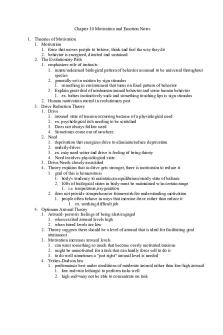ME 10 - Kim Maclin- Motivation and Emotion Lecture 10 PDF

| Title | ME 10 - Kim Maclin- Motivation and Emotion Lecture 10 |
|---|---|
| Author | Nicole Williams |
| Course | Motivation And Emotion |
| Institution | University of Northern Iowa |
| Pages | 4 |
| File Size | 25.1 KB |
| File Type | |
| Total Downloads | 6 |
| Total Views | 139 |
Summary
Kim Maclin- Motivation and Emotion Lecture 10...
Description
Chapter 2: Motivation in Historical and Contemporary Perspectives ● Philosophical origins of motivational concepts ○ The intellectual roots of motivation study owe their origin to the ancient Greeks. ○ Plato proposed that motivation flowed from a tripartite,hierarchically arranged soul. ● Grand Theories ○ Grand theory is a phrase that is an all encompassing theory that seeks to explain the full range of motivated action. ● Freud's Drive Theory ○ Freud summarized his drive theory with four componentssource, impetus, aim, and object. ○ The source of drive is rooted in the body’s physiology. ● Hull’s Drive Theory ○ Hull’s drive theory had one outstanding feature that no motivation theory before it had ever possessed- namely, motivation could be predicted before it occurred. ○ With both the instinct and the will, it was impossible to predict in an a priori fashion when and whether or not a person would be motivated.
● Mini Theories ○ Mini-theories limit their attention to specific motivational phenomenon. ○ Mini theories seek to understand or investigate one particular ■ Motivational phenomenon ■ Particular circumstances that affect motivation ■ Groups of people ■ Theoretical question ○ Achievement motivation theory (A mini theory) Arose to explain how people respond to standards of excellence, and hence why some people show enthusiasm and approach, whereas others show anxiety and avoidance, when facing a standard of excellence. ● Active Nature of the Person ○ Motivation was the study of energizing the passive. ○ The psychologists of the second half of the century saw things differently. ○ The person was always getting to and doing something. ○ The passive-oriented portrayals outnumbered the activeoriented portrayals by 10 to 1.
○ But theories assuming an active organism were beginning to emerge. ○ Todays ideas about motivation and emotion accept the premise of the active organism, and they deal little with deficit motivations and much with growth motivations. ○ Contemporary motivation study concerns itself with the study of purpose and volition in inherently active people. ● Applied, Socially Relevant Research ○ Researchers turned their attention to questions that were relevant to solving the motivational problems people faced in their lives at work. ○ In school, in coping with stress, in solving health problems, in reversing depression, and so on. ● Conclusion ○ The fundamental questions of motivation therefore shifted. ● Summary ○ First, motivation study rejected its commitment to a passive view of human nature and adopted a more active
portrayal of human beings. ○ Second, motivation turned decidedly cognitive and somewhat humanistic. ○ Third, the field focused on applied, socially relevant problems. ●...
Similar Free PDFs

Chapter 10 Motivation and Emotion
- 10 Pages

Motivation and Emotion 2
- 41 Pages

Motivation and emotion
- 52 Pages

Motivation and Emotion 1
- 58 Pages

(10) Motivation
- 6 Pages

Motivation, Emotion, and Stress
- 7 Pages

10. neuroscience + emotion
- 4 Pages

Chapter 8 Motivation and Emotion
- 4 Pages

15-16 - Motivation and Emotion
- 8 Pages

Emotion und Motivation
- 135 Pages

(ME) Case 10 - revise
- 2 Pages
Popular Institutions
- Tinajero National High School - Annex
- Politeknik Caltex Riau
- Yokohama City University
- SGT University
- University of Al-Qadisiyah
- Divine Word College of Vigan
- Techniek College Rotterdam
- Universidade de Santiago
- Universiti Teknologi MARA Cawangan Johor Kampus Pasir Gudang
- Poltekkes Kemenkes Yogyakarta
- Baguio City National High School
- Colegio san marcos
- preparatoria uno
- Centro de Bachillerato Tecnológico Industrial y de Servicios No. 107
- Dalian Maritime University
- Quang Trung Secondary School
- Colegio Tecnológico en Informática
- Corporación Regional de Educación Superior
- Grupo CEDVA
- Dar Al Uloom University
- Centro de Estudios Preuniversitarios de la Universidad Nacional de Ingeniería
- 上智大学
- Aakash International School, Nuna Majara
- San Felipe Neri Catholic School
- Kang Chiao International School - New Taipei City
- Misamis Occidental National High School
- Institución Educativa Escuela Normal Juan Ladrilleros
- Kolehiyo ng Pantukan
- Batanes State College
- Instituto Continental
- Sekolah Menengah Kejuruan Kesehatan Kaltara (Tarakan)
- Colegio de La Inmaculada Concepcion - Cebu




